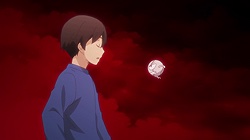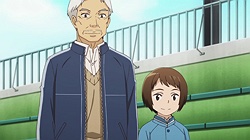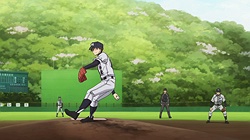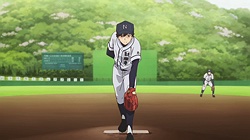 |
 |
 |
 |
 |
 |
 |
 |
 |
 |
 |
 |
 |
 |
 |
 |
 |
 |
 |
 |
 |
 |
 |
 |
 |
 |
 |
 |
 |
 |
 |
 |
 |
 |
 |
 |
 |
 |
 |
 |
 |
 |
 |
 |
 |
 |
 |
 |
「その日を再び/二人の春」 (Sonohi o Futatabi/Futarinoharu)
“The Day Again/The Second Spring”
There was a little glitch with the subtitles for Battery (hopefully not a sign of future troubles for the Amazon-NoitaminA partnership), causing the penultimate episode’s release to be delayed several days. I’m not that wild about Amazon’s subs to begin with (“-san” really doesn’t translate to “Mr.” when we’re talking about sempai and kouhai among schoolboys, as an example) but I’d be lying if I said the translations were the biggest problem with this series. And given how sky-high my expectations for it were going into the season, that’s rather disappointing.
Post-mortems are always a dodgy proposition when it comes to anime, because none of us were there when the decisions were being made at the production meetings and the like. Maybe the odd-couple partnership between Mochizuki Tomomi’s minimalist directorial style and Asano Atsuko’s more histrionic writing was destined to cause problems. Maybe the novels were too long to be adapted into an 11-episode series. Maybe there’s something lacking in the source material itself that Mochizuki just wasn’t able to fill in. But whatever the reason, in the end Battery just wasn’t everything it could have been – and looked like it was going to be at the halfway point.
The closing arc surrounds the pickup game (that’s effectively what it is) Between Nitta and Yokote Middle School. Which, if you think about it, seems like an odd place to conclude a baseball series. This isn’t an official game, and the main dramatic impetus for it is a rivalry between Takumi and a character (Kadowaki) who we didn’t even meet till halfway through the series. There’s an overblown quality to this whole rivalry, especially where Shun is involved (he pretty much defines the term as a character), which makes it hard to feel fully vested in this game and its eventual outcome.
Battery does keep teasing us with tastes of the themes that once seemed as if they would drive the series – Takumi’s relationship with his family, especially his brother. His clash with a society that doesn’t take well to too much individuality and braggadocio, especially in its children. But they’re only tastes, never full meals – and that’s the real problem here. There’s certainly enough interesting material in this premise and these characters to give us a fascinating series, but that’s not the show Mochizuki ended up making (again, whether that’s a function of the source material I don’t know).
The game itself continues this trend, with the final episode giving us only about an inning of it. The rest is dedicated to build-up, with a good chunk of that once again focused on Shun and Shuugo and their strange waltz of coltish love-hate. It’s all very odd – almost if the eleven eps we got were a slice of a planned four-cour show that was cut off at the knees. I’m not sure I’ve ever seen a series with so many unrealized plotlines and so much time spent on ones that ween’t introduced until well into the second half of its run. Again, not having read the novels it’s hard to know whether that’s a function of the material or the way it was adapted.
In the end I suppose it doesn’t really matter which it is – the anime has to be judged on its own terms, and I think in all fairness it has to be judged as largely unsuccessful. I robustly disagreed with the poor ratings Battery was receiving after five or six episodes, because I thought there were some really good things happening here. But what I’m left with is a sense of puzzlement over what the goals of the series are. Why does this story exist – what was its purpose in life? I don’t see a larger message here if one wants to view Battery symbolically – just the nascent flowerings of several interesting themes about Japanese society – and if one takes it strictly on the narrative, I don’t see how anyone could argue that the storytelling remotely finished the job.
So, for the second season in a row we have a highly-anticipated series (Bungou Stray Dogs being the other) that failed to live up to the pedigree. Fortunately both Spring and Summer had enough backup to end up as solid seasons anyway, but given all the reasons to feel optimistic about Battery – Mochizuki-sensei, NoitaminA, award-winning baseball source material – it still hurts a fair bit. I liked so much about the early episodes, and there was so much potential in the relationships the series never explored (Takumi and Seiha, Takumi and Go) and the themes it only touched on that I feel like Battery could have been really special. In a funny sort of way, the OP and both EDs told a more interesting story in 90 seconds than the main narrative did in 11 episodes – I wish they’re been an accurate reflection of what the focus of this series was going to be.
ED3 Sequence
 |
 |
 |
 |
 |
 |

As far as I know the story continues on with Seiha growing older and both he and Takumi play baseball together. I’m reading the first volume of the novel but skimmed through the other volumes’ previews.
And there’s also an important dialogue between Takumi’s mother Makiko and his grandfather about MAkiko’s position in all this, and why Takumi has become what he’s become, about their family, etc etc. All these things are left out both in anime and the movie.
This anime had the material, conflict and characters to make it into something big. It ended up being lackluster and disappointing.
well, i really enjoyed this anime, it was calm and bitter sweet.